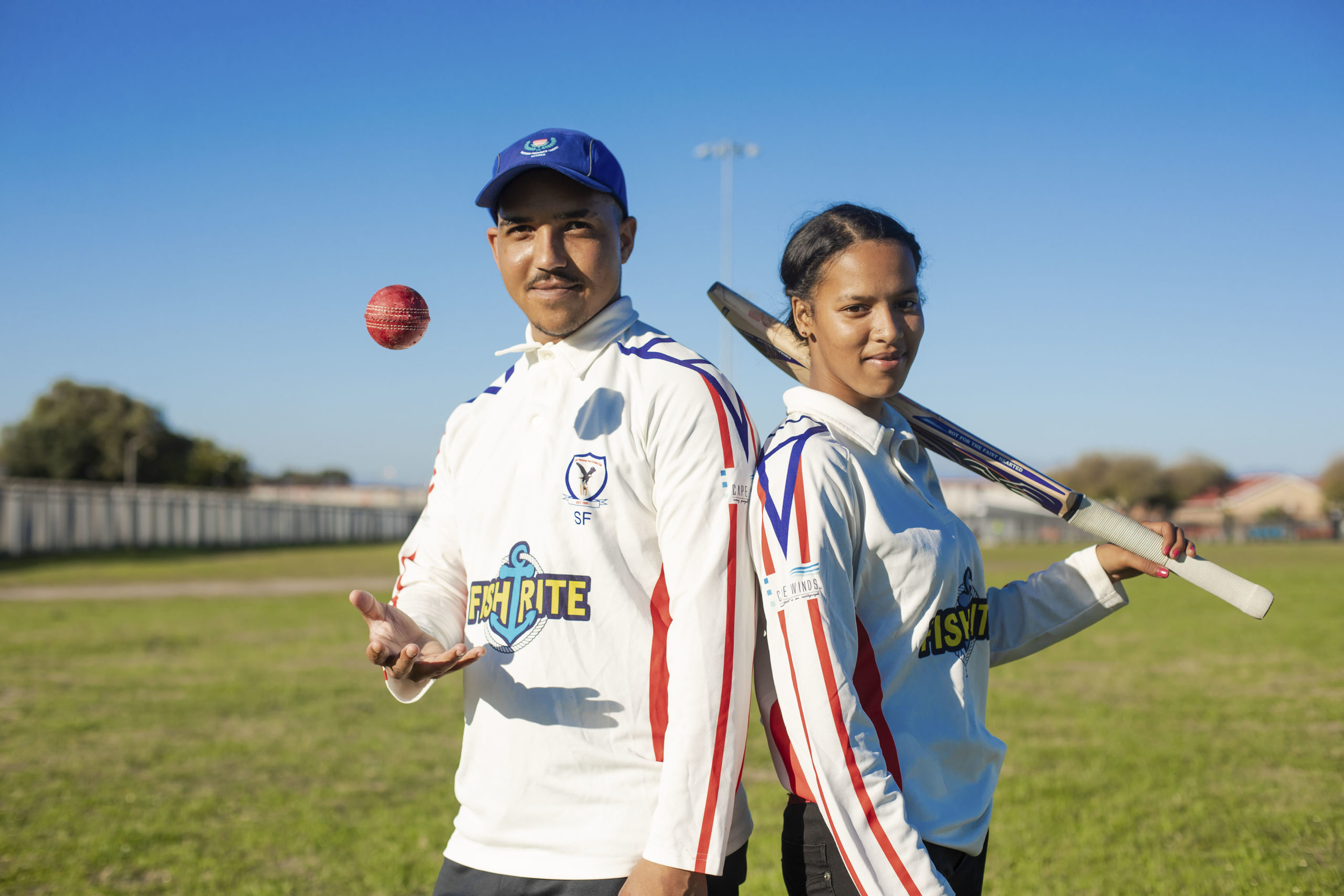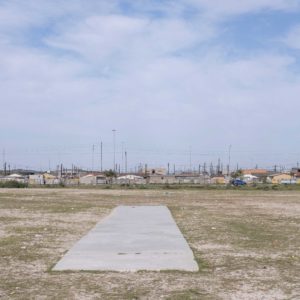Batting for escape on a field of dreams
The Fish Rite Hanover Park Cricket Club is a rare place of refuge for young people facing a harsh daily life in one of the most violent areas in the City of Cape Town.
Author:
1 September 2021

This article has been translated into Afrikaans: ‘n Veilige hawe vir drome van ontvlugting
It wouldn’t be hyperbole to suggest that a young cricketer growing up in Hanover Park on the Cape Flats in the Western Cape is more likely to dodge a bullet before he or she dodges a dangerously short delivery on the pitch.
The fragility of life in this community means just being a member of a cricket club is an exercise in self-preservation – a way to stay out of range of a gangster’s gun. Here, it means survival for youngsters, a buffer between them and the cruel streets.
Residents of Hanover Park push against the stigma of crime and gangsterism thrust on them even as countless tales of tragedy bleed from the pages of newspapers and websites. These tragic scenes sometimes play out every day or sometimes once or twice a week, but they play out without fail and in varying degrees of intensity as Hanover Park feels the excruciating effects of a volatile cocktail of gangs, unemployment and drug abuse, mixed with a debilitating viral load of Covid-19.
Related article:
It’s been relatively quieter in recent months. The lockdown and curfews may have slowed down gang activity over the past 16 months, but it certainly hasn’t stopped the shootings and killings from being the norm, even in the midst of a global pandemic that has shattered the meaning of what normal is. Turf wars between gangs living just metres apart ebb and flow according to the time of year, the religious calendar or the desire for drugs, guns and revenge.
Igsaan Hugo was brought up in Hanover Park, and although he and his family have moved away, he finds himself deeply rooted in the community through the Fish Rite Hanover Park Cricket Club, where he is head coach and a father figure to dozens of youngsters.
“Being a head coach means you have to deal with issues, like nutrition. Food is a major issue for these youngsters. In a lot of households in Hanover Park the parents don’t work. Covid has just amplified that. Nutrition is one issue, and gang violence is another. I get phone calls from my youths when gunshots are being fired right outside their homes. They tell me they’re scared. They entrust that fear to me and I try to guide them, which is difficult. It becomes very emotional at times,” Hugo says.
“I have kids myself. They are living a very comfortable life, but I know in the background that my other youths, my other children, are not able to live that lifestyle. They live in fear, not just of gang violence, but of domestic abuse.”
A history of restlessness
Hanover Park has a history of struggle, being the place from where mass boycotts and protests spread countrywide from February 1980 onwards in schools predominantly attended by those classified as coloureds and Indians by the apartheid regime. Young people in Hanover Park spoke out against poor conditions in their schools and soon these protests spread to universities, resulting in tens of thousands of young people being mobilised against the oppressive regime of the day. “HP”, as it is affectionately known, has been restless for a very long time.
Arguably one of the least contested pieces of turf is the Hanover Park cricket field, which sits alongside an artificial football pitch sandwiched between Downberg Road and Jan Smuts Drive. Though it has more sand and thorns than grass, it is a haven for restless youngsters looking for respite from their daily struggle.
Fish Rite Hanover Park Cricket Club was founded in 1991 for the sole purpose of creating a safe space for boys and girls to enjoy the game of cricket. Former first-class cricketer Faiek Davids shone a light on a better path through cricket, but there are many more hurdles for the young to climb.
Related article:
“The club has something special,” says Hugo. “There are a lot of very talented cricketers here, rough diamonds that just need a bit of polishing and a fair opportunity to showcase that talent. Our talented youth need to get the exposure, but the schools of excellence get the first choice because we’re seen as the rotten apples. Some adults who come from the leafy suburbs won’t be able to deal with the challenges these kids face.”
Carlyle Roberts, 19, lost his best friend at a young age. Gunned down. Another statistic among the hundreds of children killed and maimed in Hanover Park’s troubled streets. Since his friend’s death, Roberts has stayed close to the cricket field for safety, but also out of a desire to play professional cricket.
“It’s tough here for a boy. You can’t just walk where you want to, because there’s a lot of jealous boys here. You can’t be better than them, and you can’t just visit your school friends whenever you want to,” Roberts says. “That’s why I prefer being here by the cricket club. This is my passion. I want to become a professional cricket player. I’ve been playing for Western Province since [I was] 11 years old and I love opening the batting. Quinton de Kock is my hero and I want to be like him.”
Roberts says he was “born with cricket” in him. His story is a familiar one of passion for sport that runs deep among the people of Hanover Park.
Inspirational heroes
The area’s most famous sporting son is none other than South African football legend Benni McCarthy. His rags-to-riches story is well documented, but it is still a rarity in an area that has seen more dreams shrink in the dark than grow for all to see. The accomplished singer Vicky Sampson says her political and community activism comes from growing up in Hanover Park. Mamelodi Sundowns midfielder Haashim Domingo is making a name for himself on the football field and emerged from HP relatively unscathed, though he had to endure the horror of seeing his peers being killed in front of him.
It’s not always gloomy, though, as another HP faithful, musician Jonathan Rubain, can attest. Rubain has carved out a successful career on the South African music scene and is a source of immense pride to the community. His music shares a hopeful side of the people here, who are deeply religious and overcome daily struggles with their heads held high. Rubain is a patron of the cricket club and lends support by facilitating visits by former Proteas players like Vernon Philander and former Proteas assistant coach Vincent Barnes.
Related article:
A short distance away from the cricket field, a handful of children play football on an old tarmac netball court between Ryburg and Lonedown roads. The hoops are missing from the poles. The adjacent playground is empty, presumably because occasional exchanges of gunfire are known to take place right across this open piece of land.
Nearby, a patrol vehicle from the police’s anti-gang unit crawls sluggishly while its three occupants scrutinise every parked vehicle and movement of young men and boys. The officer in the passenger seat nervously keeps one hand on his gun holster and both eyes on the pedestrians outside. The calm can vanish in an instant here, and no one ever sees it coming – certainly not the authorities and those tasked with keeping the community safe.
The army was deployed to the Cape Flats in July 2019 to curb gang violence that had spiralled out of control. According to the 2018-2019 crime statistics, more than 1 100 murders were linked to gangs in South Africa, of which 938 occurred in the Western Cape. Hanover Park sits in the precinct that was among the top four most violent in 2018-2019. The anti-gang unit has had its hands full trying to cover multiple gang hotspots on the Cape Flats.
“Not everyone in Hanover Park is a gangster. Not everyone here sells drugs,” Hugo says. “There are good people in Hanover Park. Their situation just doesn’t allow them to leave. Parents would love to take their children out of Hanover Park. There’s a stigma that this is a gang-ridden area, but we see so much good in this community – people who feed the community and take care of the children in the area. They’re not bad people, they just don’t have money.”
Finding refuge
Life for a young woman like Tamia Amos, 20, is particularly precarious in HP, as it is in most places in South Africa. But the daily threat of crime has done little to dampen her spirit and love for cricket.
“I joined the cricket club in grade 11. I just wanted to join something. It’s better to join something than just lie at home and do nothing,” Amos says. “I want to play until I’m 60 or 70 years old. I want a job where I can only work five days a week so I can play on a Sunday.”
Amos finds refuge inside the boundaries of the cricket field and plans to use this opportunity to transition to a better life with greater opportunities. “It’s tough living in Hanover Park. It’s dangerous here. We can’t just walk like we want to because of the gang violence. I’m afraid of walking out of my house. I’m so paranoid,” Amos says.
“I could see a normal guy and think he’s going to rob me, or he has a gun, because I have been robbed before. The club has always been there for me, even during Covid time. There were times when we had nothing and they would come through for us, like a family. But not only for my family, for everyone’s family.”

Despite the ever-present threat of violence and murder, Hanover Park survives. It is its residents’ resilience and tenacity, their will to live and succeed that allow it to grow talent that should and must be exposed on the national and international stage.
“Sport has always united people,” Hugo says. “Look around here. This is not a normal sports ground. We’ve got thorns all over the nets. Conditions are terrible. Transformation needs to take place, but transformation in a way that’s going to impact the community. Don’t build a skateboard park in Hanover Park! Nobody’s going to make use of a skateboard park.
“Spend the money in the correct areas so that we can see the improvement in kids, keep them off the roads, keep them occupied with skills development. Those are the things that this community needs. Seeds of hope need to be planted for them.”



